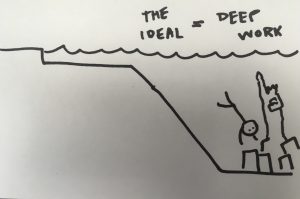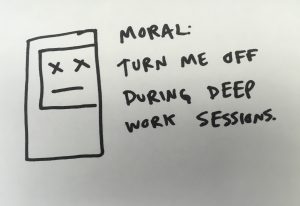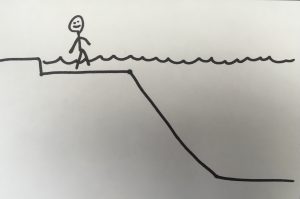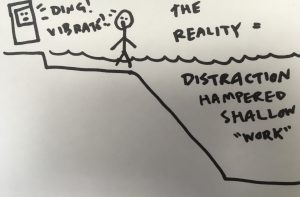For study sessions to work their best (meaning you acquire maximum learning for the amount of time you put in), they need to be deep and focused. The only way they can be deep, though, is if we ruthlessly eliminate distractions. As Cal Newport says in Deep Work, “distraction is the destroyer of depth.”
Think of a given study session like a pool.
Our goal is to spend as much of the study session as possible in the deep end. Down where it's deep, we get to make meaning in our brains — we neurosculpt. This is where connections are formed, new knowledge is solidified, texture is added to what we already know, and clear questions are formulated. The ideal is lots of this deep work and very little time in the shallows.

Unfortunately, most students don't get much time in the deep end because every time they are distracted by a buzz, ding, beep, alert, or ringtone, their brain either checks it or musters the willpower reserves to ignore it.
As a result, the average learner can spend endless hours studying, only to receive minimal gain from the time spent.
The solution? Turn the phone off, set a timer or mark a clock for 25 minutes, and then spend those 25 minutes immersed in a task. Prior to starting, consider trying some quick mental contrasting or setting a measurable goal for the work you'd like to accomplish (e.g., I'm going to read 25 pages of the novel for English; I'm going to solve 10 problems from the homework set; I'm going to take notes on 10 pages of the history textbook; I'm going to complete my article of the week response). Then, for 25 minutes, do only that.
Afterwards, feel free to reward yourself by checking those precious SnapFace messages — after all, the streaks must not be broken!
 [hr]Thank you to my college teaching buddy Kristen L. for introducing me to the fascinating phenomenon of traumatic Snapchat streak losses.
[hr]Thank you to my college teaching buddy Kristen L. for introducing me to the fascinating phenomenon of traumatic Snapchat streak losses.


patrycja says
Dave, I just finished your book, Never Finished, and I want to reach out and thank you for it. Not only did it offer a lot of philosophy and mindsets to apply to my teaching practice, but it also gave me a lot of actionable tips I will implement from grading, to calling parents, to working with fellow teachers. I especially liked your metaphor or teachers as lighthouses– simply beautiful. I’ll be reading your book again in August before the school year, bookmarking it, highlighting it to remind me of the ideas I want to implement.
Have a great week 🙂